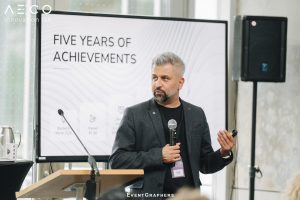An institute at Ryerson University in Toronto is aiming to become a world-renowned research and training institute providing innovative technical and policy solutions to contemporary infrastructure challenges, says its new executive director.
The Ryerson Institute for Infrastructure Innovation (RIII) was launched in 2014 and was being administered by an academic director before Ashley De Souza was brought on as the executive director earlier this year. His role is to expand operations and take the institute to the next level.
He said the institute is the first of its kind in Canada and that, to the best of his knowledge, there are no academic institutes dedicated solely to infrastructure, looking at procurement.
"Where I see the opportunity there, and how we’re unique and different, is RIII connects both the public and private sector to students and faculty here at the university — leading experts and researchers in academia," explained De Souza, who is the former director of government relations for the Ontario Road Builders’ Association.
According to the RIII website, the institute provides a catalyst for innovation on all aspects of infrastructure design, construction, financing, maintenance and operations and seeks collaboration with private industry, public agencies and governments.
Ashley De Souza
Ryerson Institute for Infrastructure Innovation
"What I see this institute being is a hub to bring folks together to discuss important public policy initiatives and push the envelope in terms of what is the next wave of infrastructure, how to identify and improve procurement models, what are new and emerging technologies and equipment that should be looked at," De Souza stated. "The institute is uniquely positioned to address some of these big infrastructure challenges and really act as that hub to advance these public policy debates."
As an institute, the RIII is looking to partner with individual companies, government and industry associations to help advance the infrastructure agenda.
According to De Souza, the RIII provides interdisciplinary research and innovation; expertise and training of high quality personnel; and connects cross-sector stakeholders.
"This is an unprecedented opportunity for our industry to drive discussion and influence research, but also to ensure that we are able to better equip future generations with the tools necessary to compete in this evolving infrastructure landscape," said De Souza. "The models have changed over the years, the projects are getting bigger, the investment dollars are getting larger. I think this is amazing opportunity for Ryerson and RIII to help industry as they grow within this infrastructure spending plan that all levels of government are embarking on right now."
The areas of focus the institute considers in order to partner and collaborate are: innovative project delivery procurement models (Alternative Financing and Procurement, design-builds and construction manager/general contractor); big data and urban informatics; urban systems engineering and infrastructure asset management; innovative construction materials, systems and design; climate change; and resilient infrastructure.
"We have an opportunity to really create something special at this institute…for better synergies and forging strong relationships between the construction industry and Ryerson University and particularly the Faculty of Engineering and Architectural Science at Ryerson," De Souza explained.
He sees his role as being a facilitator to bridge the gap between the university and the construction industry and to be a conduit between industry/government as well as the faculty and students at Ryerson.
"I have been speaking with a lot of public sector owners to see what their needs are and see how we can help," said De Souza.
"In my previous roles, I’ve noticed there has been a huge gap when it comes to formalized educational programs in the procurement realm. This is an opportunity for RIII to help address those education and knowledge gaps. If we can help create more professional formalized training programs for procurement professionals both in public and private sectors, I think we’re helping to give companies and governments the tools necessary as we move forward with further infrastructure development and investments."











Recent Comments